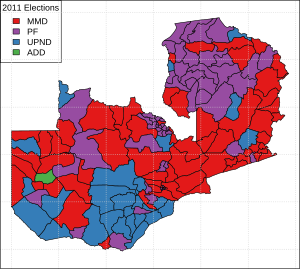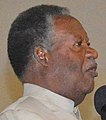Zambian presidential election, 2011
|
|
|||||||||||||||||
|---|---|---|---|---|---|---|---|---|---|---|---|---|---|---|---|---|---|
|
|||||||||||||||||
|
|||||||||||||||||

|
|||||||||||||||||
|
|||||||||||||||||
General elections were held in Zambia on 20 September 2011, electing a President and members of the National Assembly.Michael Sata of the Patriotic Front (PF) won the presidential elections, defeating incumbent Rupiah Banda of the Movement for Multi-Party Democracy (MMD), and was sworn into office on 23 September. The PF emerged as the largest party in the National Assembly, winning 60 of the 148 seats decided on election day.
Incumbent President Rupiah Banda, of the ruling Movement for Multi-Party Democracy party, ran for his first full term as President after replacing Levy Mwanawasa, who died in August 2008.
Michael Sata was the candidate of the Patriotic Front and Hakainde Hichilema was the candidate of the United Party for National Development.
With Chinese companies investing US$2 billion by the end of 2010 in the Zambian economy, the status of Chinese business ties with Zambia, Africa's largest copper producer, grew significantly. Early in his campaign, Sata accused the Chinese mining firms of having slave-like labour conditions and ignoring safety standards and local cultural practices. He has been nicknamed "King Cobra" because of his harsh rhetoric, but he later toned down his rhetoric against the mostly Chinese foreign mining firms.
Two days before the results were officially announced, the High Court banned three independent media outlets from publishing speculation on the result after The Post published a headline reading "Sata Heads for Victory." The same day, Banda's office also said that such reports were "rumours" as no final result had been compiled. The delay in announcing the results was the cause of riots in Ndola and Kitwe, where youths fought with riot police while also burning vehicles and markets. Additionally, hackers attacked the Election Commission's website that night and posted false results suggesting Sata won by a landslide.
...
Wikipedia


